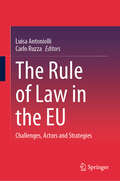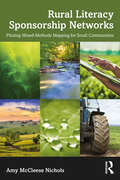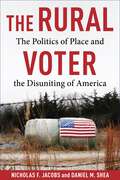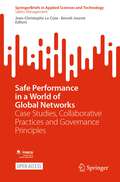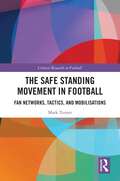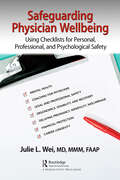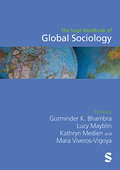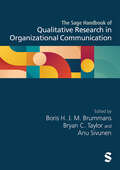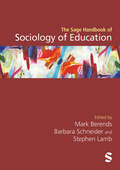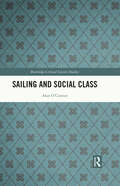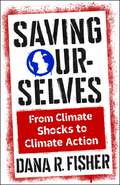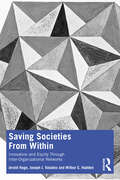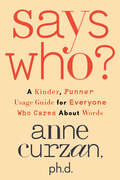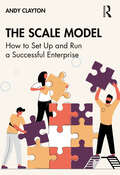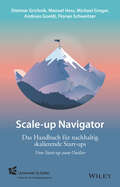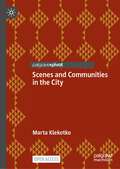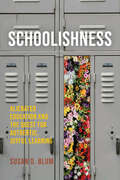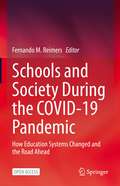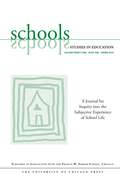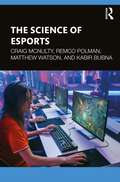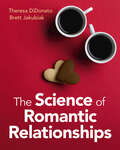- Table View
- List View
The Rule of Law in the EU: Challenges, Actors and Strategies
by Carlo Ruzza Luisa AntoniolliThis book reflects on the nature of the rule of law in the European Union and the present and future consequences of the attacks that are undermining it. Presenting various case studies, it analyses violations of the rule of law and their impact on the quality of European democracy and on the workings of civil and political society. Written from an interdisciplinary perspective, the book connects legal aspects related to infringements of the rule of law with their political and sociological consequences at both a general and the EU level.The book is divided into three parts. The first focuses on the rule of law in the European context and the threats to democracy posed by its violations. It examines how populist movements and parties utilize the erosion of the checks and balances in liberal democracies to weaken resisting intermediate bodies, such as dissenting civil society groups. The second part concentrates on the political perspectives, which it approaches both in terms of its general features and through a set of case studies related to violations of the rule of law. The third part provides a legal perspective on these issues and examines the impact of the rule of law and its infringement in several areas, impacting both the internal and external dimensions of the EU.
Rural Literacy Sponsorship Networks: Piloting Mixed-Methods Mapping for Small Communities
by Amy McCleese NicholsThis text provides an in-depth exploration of rural community literacy, examining the ways in which community-building, social networks, time, race, and politics interplay.Mapping the dense literacy sponsorship network of a small rural town in the southeastern United States, Nichols offers a window into the challenges and successes of collective literacy sponsorship. Through an original mapping-focused approach, the book explores multiple social and environmental layers that construct literacy sponsorship writ large.This approach provides a novel methodological entry to rural literacies and will be key reading for rural community literacy advocates, literacy scholars, graduate students, and researchers.
The Rural Voter: The Politics of Place and the Disuniting of America
by Nicholas F. Jacobs Daniel SheaThe widening gulf between rural and urban America is becoming the most serious political divide of our day. Support for Democrats, up and down the ballot, has plummeted throughout the countryside, and the entire governing system is threatened by one-party dominance. After Donald Trump’s surprising victories throughout rural America, pundits and journalists went searching for answers, popping into roadside diners and opining from afar. Rural Americans are supposedly bigots, culturally backward, lazy, scared of the future, and radical. But is it that simple? Is the country splintering between two very different Americas—one rural, one urban?This pathbreaking book pinpoints forces behind the rise of the “rural voter”—a new political identity that combines a deeply felt sense of place with an increasingly nationalized set of concerns. Combining a historical perspective with the largest-ever national survey of rural voters, Nicholas F. Jacobs and Daniel M. Shea uncover how this overwhelmingly crucial voting bloc emerged and how it has roiled American politics. They show how perceptions of economic and social change, racial anxieties, and a traditional way of life under assault have converged into a belief in rural uniqueness and separateness. Rural America believes it rises and falls together, and that the Democratic Party stands in the way.An unparalleled exploration of rural partisanship, this book offers a timely warning that the chasm separating urban and rural Americans cannot be papered over with policies or rhetoric. Instead, The Rural Voter shows how this division is the latest chapter in the enduring conflict over American identity.
Safe Performance in a World of Global Networks: Case Studies, Collaborative Practices and Governance Principles (SpringerBriefs in Applied Sciences and Technology)
by Jean-Christophe Le Coze Benoît JournéThis open access book provides an analytical and critical outlook, by leading scholars, of the impact of various trends in the quality of collaboration and resulting safety outcomes that arise from the evolution of traditional integrated production within a single firm into a complex web of partnerships and supply chains. In the face of increasing fragmentation within industrial production and the associated rise in the complexity of inter-organizational communication and transaction, this book analyses causal factors such as cost pressures, globalization of demand, increasingly flexible resource allocation and work organization, changes in legal liability and the possibilities afforded by information technology. Various case studies focus on the effects of crossing boundaries between organizations, between different trades and professions and between countries, assessing the effect of variations in regulatory structures and national cultures. Furthermore, they illustrate the wide range of organizational forms to be found in high-hazard industries today and the impact, potential or real, of the variety of forms of partnership on safety and well-being at work. The contributors assess the effect of out-sourcing and of various forms of partnership and governance on safety at work and how they can be made to support the prevention of major accident hazards.
The Safe Standing Movement in Football: Fan Networks, Tactics, and Mobilisations (Critical Research in Football)
by Mark TurnerThis book tells the important story of the 30-year social movement against all-seated stadia in football in England and Wales that developed in the wake of the Hillsborough stadium disaster and the wider European and international significance of that movement. Examining the fan networks, relations, tactics and interactions which built the ‘Safe Standing’ movement, it reveals an untold social history of football supporter activism and represents an important contribution to our understanding of football supporter-based social movements, the sociology of football, and to social movement studies more broadly. The book argues that Safe Standing is sociologically highly significant because the restriction and partial exclusion of football fans as a social group in the timescape of English football after Hillsborough marked a moment of profound social change in the UK. Applying relational sociology, and drawing on original research and insider access, the book considers how events and ruptures, like Hillsborough, shape the dynamics of a social movement, and shows how supporters, who have been deeply affected by the all-seating legislation, are now in a position to affect the future consumption of football. The book shows how this was achieved, how a small core network of approximately 30 supporters, networked with supporter groups across Europe, now stand to impact and shape the consumption habits of a key leisure practice all over the world. This is fascinating reading for any student, researcher or policy-maker with an interest in football, sociology, political science, public policy, or cultural and social history.
Safeguarding Physician Wellbeing: Using Checklists for Personal, Professional, and Psychological Safety
by Julie L. WeiThe United States is facing a worsening epidemic of physician burnout with unprecedented numbers of them leaving the workforce and practice of clinical medicine across all career stages. The prevalence of physician burnout has accelerated through COVID-19, resulting in an anticipated serious national shortage of physicians within the current decade amidst an increased proportion of aging and unhealthy population. The critical shortage of physicians coupled with an unhealthy physician workforce results in longer wait times for access, continued increased healthcare costs, decreased quality of care, and worsening patient experience. Despite increasing media coverage, published data, and identification of system-based factors that erode physician wellbeing, no standardized systematic solution has been implemented across hospitals, health systems, or a variety of employment models or practice settings for any or all doctors regardless of whether they are primary care, medical, or surgical subspecialists. Effective solutions to mitigate physician burnout, protect current working physicians, and keep them from leaving medicine require a SHIFT and a more individualized approach. Many proposed academic models address system-based factors, but such solutions depend greatly on those who employ doctors. Executive leadership in charge of healthcare systems are often challenged by physician burnout and their desired autonomy, against the need for standardization of care delivery to improve quality and decrease cost. Physician productivity measures continue to be based on data samples of physician compensation surveys supplied by companies like Sullivan Cotter or Medical Group Management Association (MGMA). Such benchmarks are commonly used but data may not reflect specific realities for any organizations nor the rapid changes in the landscape of US healthcare amidst mergers, acquisitions, consolidation, and shifts in employment models from insurance and online retail giants and private equity. This book uses a "checklist" approach to empower any medical student, resident, fellow, or practicing physician to create and experience psychological, personal, and professional safety and wellbeing. Not only can individual physicians choose and use these checklists themselves, but those who live with, love, and cherish one or more physicians in their families and/or lives can use this book to understand physician realities and their risks.
The Sage Handbook of Global Sociology
by Gurminder K. Bhambra Lucy Mayblin Kathryn Medien Mara Viveros-VigoyaThe SAGE Handbook of Global Sociology addresses the ‘social’, its various expressions globally, and the ways in which such understandings enable us to understand and account for global structures and processes. It demonstrates the vitality of thought from around the world by connecting theories and traditions, including reflections on European colonization, to build shared, rather than universal, understandings. Across 36 chapters, the Handbook offers a series of perspectives and cases from different locations, enabling the reader better to understand the particularities of specific contexts and how they are connected to global movements and structures. By moving beyond standard accounts of sociology and social theory, this Handbook offers both valuable insight into and scholarly contribution to the field of global sociology. Part 1: Politics Part 2: Labour Part 3: Kinship Part 4: Belief Part 5: Technology Part 6: Ecology
The Sage Handbook of Global Sociology
by Gurminder K. Bhambra Lucy Mayblin Kathryn Medien Mara Viveros-VigoyaThe SAGE Handbook of Global Sociology addresses the ‘social’, its various expressions globally, and the ways in which such understandings enable us to understand and account for global structures and processes. It demonstrates the vitality of thought from around the world by connecting theories and traditions, including reflections on European colonization, to build shared, rather than universal, understandings. Across 36 chapters, the Handbook offers a series of perspectives and cases from different locations, enabling the reader better to understand the particularities of specific contexts and how they are connected to global movements and structures. By moving beyond standard accounts of sociology and social theory, this Handbook offers both valuable insight into and scholarly contribution to the field of global sociology. Part 1: Politics Part 2: Labour Part 3: Kinship Part 4: Belief Part 5: Technology Part 6: Ecology
The Sage Handbook of Qualitative Research in Organizational Communication
by Boris H. J. M. Brummans Bryan C. Taylor Anu SivunenThe Sage Handbook of Qualitative Research in Organizational Communication is a state-of-the-art resource for scholars, students, and practitioners seeking to deepen their understanding and expertise in this dynamic field. Written by a global team of established and emerging experts, this Handbook provides a comprehensive exploration of the field’s foundational traditions of epistemology and theory, as well as its latest methodologies, methods, issues, and debates. The volume reflects a diverse range of approaches (e.g., mixed-methods, ethnographic, rhetorical, pragmatist, phenomenological, feminist, critical race, postcolonial, queer, and engaged), and covers a broad spectrum of topics ranging from data collection and analysis, to representation. Additionally, this Handbook addresses emerging trends such as digital forensics, post-qualitative research, and the transformative impact of COVID-19 on the conduct of qualitative research in organizational communication. As the first volume of its kind in this field, The Sage Handbook of Qualitative Research in Organizational Communication is a cornerstone text for scholars, students, and practitioners interested in understanding the vital role of communication in organizational life. Part 1: Approaches to Qualitative Organizational Communication Research Part 2: Data Collection in Qualitative Organizational Communication Research: Methods and Issues Part 3: Data Analysis and Representation in Qualitative Organizational Communication Research: Methods and Issues Part 4: The Future of Qualitative Organizational Communication Research
The Sage Handbook of Qualitative Research in Organizational Communication
by Boris H. J. M. Brummans Bryan C. Taylor Anu SivunenThe Sage Handbook of Qualitative Research in Organizational Communication is a state-of-the-art resource for scholars, students, and practitioners seeking to deepen their understanding and expertise in this dynamic field. Written by a global team of established and emerging experts, this Handbook provides a comprehensive exploration of the field’s foundational traditions of epistemology and theory, as well as its latest methodologies, methods, issues, and debates. The volume reflects a diverse range of approaches (e.g., mixed-methods, ethnographic, rhetorical, pragmatist, phenomenological, feminist, critical race, postcolonial, queer, and engaged), and covers a broad spectrum of topics ranging from data collection and analysis, to representation. Additionally, this Handbook addresses emerging trends such as digital forensics, post-qualitative research, and the transformative impact of COVID-19 on the conduct of qualitative research in organizational communication. As the first volume of its kind in this field, The Sage Handbook of Qualitative Research in Organizational Communication is a cornerstone text for scholars, students, and practitioners interested in understanding the vital role of communication in organizational life. Part 1: Approaches to Qualitative Organizational Communication Research Part 2: Data Collection in Qualitative Organizational Communication Research: Methods and Issues Part 3: Data Analysis and Representation in Qualitative Organizational Communication Research: Methods and Issues Part 4: The Future of Qualitative Organizational Communication Research
The Sage Handbook of Sociology of Education
by Mark Berends Barbara Schneider Stephen LambThe Sage Handbook of Sociology of Education is an international and comprehensive groundbreaking text that serves as a touchstone for researchers and scholars interested in exploring the intricate relationships between education and society. Leading sociologists from five different continents examine major topics in sociology from a global perspective. This timely, thought-provoking Handbook features contributions from leading and emerging sociology scholars, who provide their own cultural and historical perspectives on diverse—yet universal—topics; these include educational policy, social stratification, and cross-national research. 39 Chapters delve into the pressing issues faced by our global society, such as the effects of residential mobility on educational outcomes, gender and ethnic inequalities, and the impact of COVID-19 on early childhood education. Readers will gain a multifaceted view of the contours of educational inequality, from various international perspectives and focusing on country differences, as well as recommendations for expanding the practices, programs, and policies that could reduce the rising tide of inequities—especially for populations most at risk. This Handbook offers rich, diverse perspectives on the interplay between education, social inequality, and human rights around the world, making it an invaluable resource for students, researchers, and practitioners across a range of fields, including sociology, education, and social policy. PART 1: Education and Persistent Inequality PART 2: Social & Family Contexts PART 3: Schools & Educational Policy PART 4: Neighborhoods & Community PART 5: Education & Innovation in a Global Context
The Sage Handbook of Sociology of Education
by Mark Berends Barbara Schneider Stephen LambThe Sage Handbook of Sociology of Education is an international and comprehensive groundbreaking text that serves as a touchstone for researchers and scholars interested in exploring the intricate relationships between education and society. Leading sociologists from five different continents examine major topics in sociology from a global perspective. This timely, thought-provoking Handbook features contributions from leading and emerging sociology scholars, who provide their own cultural and historical perspectives on diverse—yet universal—topics; these include educational policy, social stratification, and cross-national research. 39 Chapters delve into the pressing issues faced by our global society, such as the effects of residential mobility on educational outcomes, gender and ethnic inequalities, and the impact of COVID-19 on early childhood education. Readers will gain a multifaceted view of the contours of educational inequality, from various international perspectives and focusing on country differences, as well as recommendations for expanding the practices, programs, and policies that could reduce the rising tide of inequities—especially for populations most at risk. This Handbook offers rich, diverse perspectives on the interplay between education, social inequality, and human rights around the world, making it an invaluable resource for students, researchers, and practitioners across a range of fields, including sociology, education, and social policy. PART 1: Education and Persistent Inequality PART 2: Social & Family Contexts PART 3: Schools & Educational Policy PART 4: Neighborhoods & Community PART 5: Education & Innovation in a Global Context
Sailing and Social Class (Routledge Critical Leisure Studies)
by Alan O'ConnorThis book explores the sociology of sailing and yachting. Drawing on original research, and employing a theoretical framework based on the work of Pierre Bourdieu, the book argues that sailing is, still, an upper-middle-class activity that has much to tell us about the wider sociology of leisure and sport. The book examines the historical foundations of blue-water sailing as established by naval and colonial shipping, to trace the roots of contemporary sailing and yachting culture. It also examines archives of sailing narratives and cruising guides, as well as the children’s books of Arthur Ransome, arguing that this archival material offers a social rather than a psychological interpretation of the ‘bodily investment’ in sailing. The book uses Bourdieu’s concepts of ‘illusio’ – an investment of time, emotion and body into a worthwhile activity – and ‘habitus’, or lifeworld, alongside contemporary data sets, to examine the yacht club as a social institution, including why many boats never go out on the water, the relationship between yacht clubs and the state, and social issues as manifested in yacht clubs, such as sexism, racism and homophobia. Offering a vigorous sociological critique of yachting and sailing, this book is fascinating reading for anybody with an interest in the sociology of leisure and sport, subcultures, social theory, or social issues in wider society.
Saving Ourselves: From Climate Shocks to Climate Action (Society and the Environment)
by Dana R. FisherWe've known for decades that climate change is an existential crisis. For just as long, we've seen the complete failure of our institutions to rise to the challenge. Governments have struggled to meet even modest goals. Fossil fuel interests maintain a stranglehold on political and economic power. Even though we have seen growing concern from everyday people, civil society has succeeded only in pressuring decision makers to adopt watered-down policies. All the while, the climate crisis worsens. Is there any hope of achieving the systemic change we need?Dana R. Fisher argues that there is a realistic path forward for climate action—but only through mass mobilization that responds to the growing severity and frequency of disastrous events. She assesses the current state of affairs and shows why public policy and private-sector efforts have been ineffective. Spurred by this lack of progress, climate activism has become increasingly confrontational. Fisher examines the radical flank of the climate movement: its emergence and growth, its use of direct action, and how it might evolve as the climate crisis worsens. She considers when and how activism is most successful, identifying the importance of creating community, capitalizing on shocking moments, and cultivating resilience. Clear-eyed yet optimistic, Saving Ourselves offers timely insights on how social movements can take power back from deeply entrenched interests and open windows of opportunity for transformative climate action.
Saving Societies From Within: Innovation and Equity Through Inter-Organizational Networks
by Jerald Hage Joseph J. Valadez Wilbur C. HaddenMoving beyond existing models from economics and political science, this book shows how crises in capitalism and democracy can be solved with Systemic coordinated inter-organizational networks.It offers a new model of societal coordination that builds cooperation and trust while solving today’s modern and complex practical problems: Systemic coordinated inter-organizational networks (SCIONs). It details how SCIONs can quickly catalyze organizational change among interorganizational network members while providing a general framework for characterizing individual and organizational change. The chapters apply these theoretical ideas in an epic case study of the rebuilding of the health care system in rural Nicaragua after a major natural disaster (Hurricane Mitch). They provide lessons for public health program managers while contributing to the literatures on modes of coordination and on social capital.The book is a vital text for upper-division courses on management, inter-organizational collaboration, crisis management and public health.
Says Who?: A Kinder, Funner Usage Guide for Everyone Who Cares About Words
by Anne CurzanA kinder, funner usage guide to the ever-changing English language and a useful tool for both the grammar stickler and the more colloquial user of English, from linguist and veteran professor Anne Curzan &“I was bowled over, page after page, by the author&’s fine ear for our language and her openhearted erudition. I learned a lot, and I couldn&’t have enjoyed myself more.&”—Benjamin Dreyer, New York Times bestselling author of Dreyer&’s EnglishOur use of language naturally evolves and is a living, breathing thing that reflects who we are. Says Who? offers clear, nuanced guidance that goes beyond &“right&” and &“wrong&” to empower us to make informed language choices. Never snooty or scoldy (yes, that&’s a &“real&” word!), this book explains where the grammar rules we learned in school actually come from and reveals the forces that drive dictionary editors to label certain words as slang or unacceptable.Linguist and veteran English professor Anne Curzan equips readers with the tools they need to adeptly manage (a split infinitive?! You betcha!) formal and informal writing and speaking. After all, we don&’t want to be caught wearing our linguistic pajamas to a job interview any more than we want to show up for a backyard barbecue in a verbal tux, asking, &“To whom shall I pass the ketchup?&” Curzan helps us use our new knowledge about the developing nature of language and grammar rules to become caretakers of language rather than gatekeepers of it. Applying entertaining examples from literature, newspapers, television, and more, Curzan welcomes usage novices and encourages the language police to lower their pens, showing us how we can care about language precision, clarity, and inclusion all at the same time.With lively humor and humanity, Says Who? is a pragmatic and accessible key that reveals how our choices about language usage can be a powerful force for equity and personal expression. For proud grammar sticklers and self-conscious writers alike, Curzan makes nerding out about language fun.
The Scale Model: How to Set Up and Run a Successful Enterprise
by Andy ClaytonThe Scale Model does one thing: makes it easy for business entrepreneurs to grow their businesses. Using a proven methodology that is easy to understand and implement, business teams can learn how to diagnose and solve barriers to growth. The Scale Model equips CEOs and senior leaders with a framework to assess where the pain points lie in their business, and easy-to-use templates to help them work out the solutions to enable continued growth. The Model has been used by high-growth companies around the world to achieve industry-beating growth in sales and profits, with engaged and aligned teams. In a complicated business environment, the straightforward advice and practical structure of the Scale Model provides for business planning. When you're busy running your business, you want just one place to go to fix it. This is that place. Pick up The Scale Model today, work through the tools inside, and watch your business grow. That's how easy it is.
The Scale Model: How to Set Up and Run a Successful Enterprise
by Andy ClaytonThe Scale Model does one thing: makes it easy for business entrepreneurs to grow their businesses. Using a proven methodology that is easy to understand and implement, business teams can learn how to diagnose and solve barriers to growth.The Scale Model equips CEOs and senior leaders with a framework to assess where the pain points lie in their business, and easy-to-use templates to help them work out the solutions to enable continued growth. The Model has been used by high-growth companies around the world to achieve industry-beating growth in sales and profits, with engaged and aligned teams. In a complicated business environment, the straightforward advice and practical structure of the Scale Model provides for business planning.When you're busy running your business, you want just one place to go to fix it. This is that place. Pick up The Scale Model today, work through the tools inside, and watch your business grow. That's how easy it is.
Scale-up-Navigator: Das Handbuch für nachhaltig skalierende Start-ups - vom Start-up zum Outlier
by Dietmar Grichnik Manuel Hess Michael Greger Andreas Goeldi Florian SchweitzerMit Case Studies von Scale-ups wie DeepL, SumUp, 1KOMMA5°, Frontify oder Ledgy! Europa hat mit seinen über 700 Millionen EinwohnerInnen einen großen Binnenmarkt, auf dem aber keine Technologieunternehmen vom Kaliber globaler Big Techs wie Apple, Alphabet/Google, Amazon, Meta/Facebook oder Microsoft gelistet sind. In der ersten Digitalisierungswelle des Internets genossen die USA durch ihren homogenen Heimatmarkt einen klaren Wachstumsvorteil. Dies mag sich durch maschinelle Übersetzungstools und weitere KI-unterstützte Lösungen ändern. Hierzu muss die Skalierung von europäischen Unternehmen erlernt werden. Sie ist eine entscheidende Fähigkeit in einem Spiel auf Zeit: Start-ups müssen wachsen, bevor ihre Konkurrenz aus anderen Start-ups oder etablierten Unternehmen an ihnen vorbeizieht. Dazu gilt es, den gestiegenen Anforderungen an die soziale und ökologische Nachhaltigkeit sowie Unternehmensführung (ESG) gerecht zu werden. Dieses Buch vermittelt Leitlinien für GründerInnen, Mitarbeitende, Investoren/Investorinnen, Mentoren/Mentorinnen und weitere Stakeholder von skalierenden Start-ups, sogenannten "Scale-ups", die sie beim schnellen und nachhaltigen Wachstum unterstützen. Sie entwickeln damit ein besseres Verständnis für verschiedenste Herausforderungen bei der Skalierung ihres Unternehmens und meistern diese besser, wie beispielsweise die Entwicklung und Führung ihres Teams, die Bewertung von Wachstums- und Finanzierungsoptionen sowie die Implementierung effizienter Organisationsstrukturen und Kommunikationsprozesse. Die LeserInnen profitieren konkret von: - einer Strukturierung der Skalierung, basierend auf einem iterativen Prozess-Framework; - einem durchgehenden Fokus auf für den Kapitalmarkt relevante ESG-Kriterien; - Handlungsempfehlungen inklusive digitaler Tools, welche sie bei der Skalierung ihrer Unternehmen unterstützen.
Scenes and Communities in the City
by Marta KlekotkoThis open access book addresses the problem of creation and reproduction processes of contemporary urban communities, as well as cultural mechanisms and factors of these processes. Rejecting both the environmental determinism, and cultural reductionism of community studies, the book assumes that the postmodern city is a space of diverse urban communities that go far beyond the traditional concept of neighbourhood as well as personal and imagined communities, and thus proposes to comprehend urban community as social practice embedded in urban space. The book applies the Theory of Social Practice and the Theory of Scenes and develops the concept of socio-cultural opportunity structures in order to explain how cultural practices of individuals and symbolic dimensions of territory interact, leading to (re)production of various forms of urban community. It is assumed that culture in general and symbolic meanings of territory in particular, play a crucial role in the process of (re)production of urban communities, that this process takes place in collective cultural consciousness and is mediated by territorially embedded cultural practices of individuals. The book overcomes theoretical gaps in classical community studies and develops a new perspective on urban communal processes based on the analysis of social practices in urban cultural scenes.
Schoolishness: Alienated Education and the Quest for Authentic, Joyful Learning
by Susan D. BlumIn Schoolishness, Susan D. Blum continues her journey as an anthropologist and educator. The author defines "schoolishness" as educational practices that emphasize packaged "learning," unimaginative teaching, uniformity, constant evaluation by others, arbitrary forms, predetermined time, and artificial boundaries, resulting in personal and educational alienation, dependence, and dread.Drawing on critical, progressive, and feminist pedagogy in conversation with the anthropology of learning, and building on the insights of her two previous books Blum proposes less-schoolish ways of learning in ten dimensions, to lessen the mismatch between learning in school and learning in the wild. She asks, if learning is our human "superpower," why is it so difficult to accomplish in school? In every chapter Blum compares the fake learning of schoolishness with successful examples of authentic learning, including in her own courses, which she scrutinizes critically.Schoolishness is not a pedagogical how-to book, but a theory-based phenomenology of institutional education. It has moral, psychological, and educational arguments against schoolishness that, as Blum notes, "rhymes with foolishness."
Schools and Society During the COVID-19 Pandemic: How Education Systems Changed and the Road Ahead
by Fernando M. ReimersThis open access book provides an analysis of the effects of the COVID-19 Pandemic on diverse education systems, and of the results of the policies adopted to sustain educational opportunities. Through a series of diverse national case studies, the book examines the preexisting fragilities and vulnerabilities in educational structures which shaped the nature of the varied responses, around the world, to teaching and learning during the worst crisis in public education in recent history.The chapters in the book take stock of how educational opportunities changed in various education systems around the world as a result of the Covid-19 pandemic, answering the question of what did education systems, and societies, learn about education as a result of the pandemic.The book covers diverse education systems, with varying levels of resources and facing distinct education challenges, including Brazil, Chile, Finland, Japan, Mexico, Norway, Portugal, Russia, Singapore, Spain, South Africa, and the United States.
Schools, volume 21 number 1 (Spring 2024)
by SchoolsThis is volume 21 issue 1 of Schools. Schools: Studies in Education provides a forum for classroom educators to describe and meditate on the complex experiences of school life. The journal publishes scholarly articles, reflective essays, and stories that convey how human relationships, thoughts, and emotions shape the meaning of what happens when learning actually occurs. Historical documents in “From the Archives” feature intriguing excerpts from works that provide insight into contemporary issues. Opinion pieces in “On the Horizon” feature arguments about the future of education planning and policy. Reviews critically evaluate books, films, art exhibitions, concerts, and other events that have some bearing on the meaning and value of education.
The Science of Esports
by Craig McNulty Remco Polman Matthew Watson Kabir BubnaThe Science of Esports draws from contemporary research and coach expertise to examine esports athlete health and performance from a range of disciplinary perspectives, including physiology, psychology, sociology, and nutrition. The rapid expansion of the esports industry has elevated competitive video gaming into the realm of high performance, requiring players, coaches, and practitioners to implement interdisciplinary approaches to performance support. The book covers key topic areas such as: What esports is and similarities and differences to sport Game-specific training Physiological and psychological consideration for esports athletes Social aspects of player performance and the social environment of esports Esports coaching and structure of esports performance environments Technology and its use in esports Safeguarding, cheating, and gambling This book includes worked examples and case studies to allow immediate implementation into practice for esports athletes and coaches. It summarises the current state of research to inform researchers and identify gaps in knowledge. This book is critical reading for students of esports and related courses. It serves as the first scientific resource designed to provide athletes, coaches, and practitioners with interdisciplinary insights into esports health and performance.
The Science of Romantic Relationships
by Theresa DiDonato Brett JakubiakWhy do people fall in love? Does passion fade with time? What makes for a happy, healthy relationship? This introduction to relationship science follows the lifecycle of a relationship – from attraction and initiation, to the hard work of relationship maintenance, to dissolution and ways to strengthen a relationship. Designed for advanced undergraduates studying psychology, communication or family studies, this textbook presents a fresh, diversity-infused approach to relationship science. It includes real-world examples and critical-thinking questions, callout boxes that challenge students to make connections, and researcher interviews that showcase the many career paths of relationship scientists. Article Spotlights reveal cutting-edge methods, while Diversity and Inclusion boxes celebrate the variety found in human love and connection. Throughout the book, students see the application of theory and come to recognize universal themes in relationships as well as the nuances of many findings. Instructors can access lecture slides, an instructor manual, and test banks.
